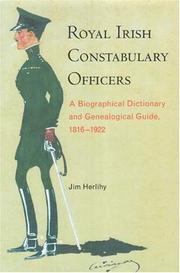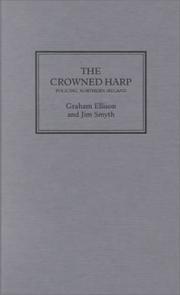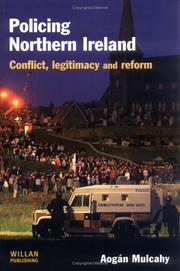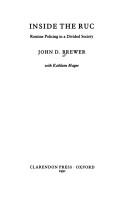| Listing 1 - 8 of 8 |
Sort by
|

ISBN: 1851828265 Year: 2005 Publisher: Dublin Four courts press
Abstract | Keywords | Export | Availability | Bookmark
 Loading...
Loading...Choose an application
- Reference Manager
- EndNote
- RefWorks (Direct export to RefWorks)
Book
ISBN: 9780415691949 9780203070000 9781135089559 9781135089504 9781135089542 9781138899988 Year: 2014 Publisher: Abingdon Routledge
Abstract | Keywords | Export | Availability | Bookmark
 Loading...
Loading...Choose an application
- Reference Manager
- EndNote
- RefWorks (Direct export to RefWorks)
Ireland. --- Garda Síochána na hÉireann --- Royal Irish Constabulary

ISBN: 1849640327 0585425825 9781849640329 0745313981 9780745313986 9780745313931 0745313930 Year: 2000 Publisher: London Sterling, Va. : Pluto Press,
Abstract | Keywords | Export | Availability | Bookmark
 Loading...
Loading...Choose an application
- Reference Manager
- EndNote
- RefWorks (Direct export to RefWorks)
Police --- Royal Ulster Constabulary. --- R.U.C. --- RUC --- Northern Ireland. --- Ulster Constabulary, Royal --- Royal Ulster Constabulary GC --- Royal Ulster Constabulary George Cross --- Constáblacht Ríoga Uladh --- Royal Irish Constabulary --- Police Service of Northern Ireland
Book
ISBN: 1787446794 1783275111 Year: 2020 Publisher: Woodbridge : The Boydell Press,
Abstract | Keywords | Export | Availability | Bookmark
 Loading...
Loading...Choose an application
- Reference Manager
- EndNote
- RefWorks (Direct export to RefWorks)
Reassesses the context in which the state of Northern Ireland was created.
Ulster (Northern Ireland and Ireland) --- Ireland --- Cúigh Uladh (Northern Ireland and Ireland) --- History --- Politics and government --- Politics and government. --- HISTORY / Europe / Ireland. --- Ireland. --- Irish revolution. --- Irish war of independence. --- Lisburn. --- Northern Ireland. --- RIC. --- RUC. --- Royal Irish Constabulary. --- Royal Ulster Constabulary. --- USC. --- UVF. --- Ulster Special Constabulary. --- Ulster Volunteer Force. --- Ulster. --- Unionism. --- partition. --- post-war Ireland.

ISBN: 1843920727 Year: 2006 Publisher: Cullompton Willan
Abstract | Keywords | Export | Availability | Bookmark
 Loading...
Loading...Choose an application
- Reference Manager
- EndNote
- RefWorks (Direct export to RefWorks)
Police --- Police-community relations --- Social problems --- Reform, Social --- Social reform --- Social welfare --- Social history --- Applied sociology --- Public relations --- Police Service of Northern Ireland. --- Royal Ulster Constabulary. --- R.U.C. --- RUC --- Northern Ireland. --- Ulster Constabulary, Royal --- Royal Ulster Constabulary GC --- Royal Ulster Constabulary George Cross --- Constáblacht Ríoga Uladh --- Royal Irish Constabulary --- Police Service of Northern Ireland --- PSNI --- Royal Ulster Constabulary --- Ulster (Northern Ireland and Ireland) --- Cúigh Uladh (Northern Ireland and Ireland) --- Politics and government. --- Social conditions.

ISBN: 0198278462 Year: 1991 Publisher: Oxford : Clarendon Press,
Abstract | Keywords | Export | Availability | Bookmark
 Loading...
Loading...Choose an application
- Reference Manager
- EndNote
- RefWorks (Direct export to RefWorks)
Irish unification question --- Police --- -Police --- -Police psychology --- -Police-community relations --- -#RBIB:XTOF --- Public relations --- Psychology, Police --- Psychology, Applied --- Police morale --- Cops --- Gendarmes --- Law enforcement officers --- Officers, Law enforcement --- Officers, Police --- Police forces --- Police officers --- Police service --- Policemen --- Policing --- Criminal justice, Administration of --- Criminal justice personnel --- Peace officers --- Public safety --- Security systems --- Unification of Ireland --- Attitudes --- -Case studies --- Case studies --- Psychological aspects --- Legal status, laws, etc. --- Royal Ulster Constabulary --- R.U.C. --- RUC --- Northern Ireland. --- Ulster Constabulary, Royal --- Royal Ulster Constabulary GC --- Royal Ulster Constabulary George Cross --- Constáblacht Ríoga Uladh --- Royal Irish Constabulary --- Police Service of Northern Ireland --- Police-community relations --- Police psychology --- #RBIB:XTOF --- Attitudes&delete& --- Royal Ulster Constabulary.
Book
ISBN: 3319759981 331975999X Year: 2018 Publisher: Cham : Springer International Publishing : Imprint: Palgrave Macmillan,
Abstract | Keywords | Export | Availability | Bookmark
 Loading...
Loading...Choose an application
- Reference Manager
- EndNote
- RefWorks (Direct export to RefWorks)
This book explores the challenges of combating terrorism from a policing perspective using the example of the Royal Ulster Constabulary GC (RUC) in Northern Ireland. The RUC was in the frontline of counter-terrorism work for thirty years of conflict during which time it also provided a normal policing service to the public. However, combating a protracted and vicious terrorist campaign exacted a heaving price on the force. Importantly, the book addresses a seriously under-researched theme in terrorism studies, namely, the impact of terrorism on members of the security forces. Accordingly, the book examines how officers have been affected by the conflict as terrorists adopted a strategy which targeted them both on and off duty. This resulted in a high percentage of officers being killed whilst off duty - sometimes in the company of their wives and children. The experience of officers' wives is also documented thus highlighting the familial impact of terrorism. Generally speaking, the victims of terrorist attacks have received scant scholarly attention which has resulted in victims' experiences being little understood. This piece of work casts a specific and unique light on the nature of victimhood as it has been experienced by members of this branch of the security forces in Northern Ireland. Neil Southern is a Senior Lecturer in Politics in the Department of Psychology, Sociology and Politics at Sheffield Hallam University, UK. A recipient of the Lemberger-Mettrick Prize for Politics from The Queen's University of Belfast, he has also published academic articles in leading international journals on the theme of ethnic conflict.
Royal Ulster Constabulary --- R.U.C. --- RUC --- Northern Ireland. --- Ulster Constabulary, Royal --- Royal Ulster Constabulary GC --- Royal Ulster Constabulary George Cross --- Constáblacht Ríoga Uladh --- Royal Irish Constabulary --- Police Service of Northern Ireland --- History. --- Peace. --- Terrorism. --- Great Britain-Politics and gover. --- Police. --- Crime—Sociological aspects. --- Conflict Studies. --- Terrorism and Political Violence. --- British Politics. --- Policing. --- Crime and Society. --- Cops --- Gendarmes --- Law enforcement officers --- Officers, Law enforcement --- Officers, Police --- Police forces --- Police --- Police officers --- Police service --- Policemen --- Policing --- Criminal justice, Administration of --- Criminal justice personnel --- Peace officers --- Public safety --- Security systems --- Acts of terrorism --- Attacks, Terrorist --- Global terrorism --- International terrorism --- Political terrorism --- Terror attacks --- Terrorist acts --- Terrorist attacks --- World terrorism --- Direct action --- Insurgency --- Political crimes and offenses --- Subversive activities --- Political violence --- Terror --- Coexistence, Peaceful --- Peaceful coexistence --- International relations --- Disarmament --- Peace-building --- Security, International --- War --- Legal status, laws, etc. --- Political violence. --- Great Britain—Politics and government. --- Violence --- Terrorism
Book
ISBN: 9781781383544 1781383545 1781382972 9781781382974 1786944014 Year: 2016 Publisher: Liverpool : Liverpool University Press,
Abstract | Keywords | Export | Availability | Bookmark
 Loading...
Loading...Choose an application
- Reference Manager
- EndNote
- RefWorks (Direct export to RefWorks)
This book examines the grass-roots relationship between the Irish Republican Army (IRA) and the civilian population during the Irish Revolution. It is primarily concerned with the attempts of the militant revolutionaries to discourage, stifle, and punish dissent among the local populations in which they operated, and the actions or inactions by which dissent was expressed or implied.Focusing on the period of guerilla war against British rule from c. 1917 to 1922, it uncovers the acts of 'everyday' violence, threat, and harm that characterized much of the revolutionary activity of this period. Moving away from the ambushes and assassinations that have dominated much of the discourse on the revolution, the book explores low-level violent and non-violent agitation in the Irish town or parish. The opening chapter treats the IRA's challenge to the British state through the campaign against servants of the Crown - policemen, magistrates, civil servants, and others - and IRA participation in local government and the republican counter-state. The book then explores the nature of civilian defiance and IRA punishment in communities across the island before turning its attention specifically to the year that followed the 'Truce' of July 1921.This study argues that civilians rarely operated at either extreme of a spectrum of support but, rather, in a large and fluid middle ground. Behaviour was rooted in local circumstances, and influenced by local fears, suspicions, and rivalries. IRA punishment was similarly dictated by community conditions and usually suited to the nature of the perceived defiance. Overall, violence and intimidation in Ireland was persistent, but, by some contemporary standards, relatively restrained.
Violence. --- Intimidation. --- Violence --- Intimidation --- History --- Irish Republican Army --- Irish Republican Army. --- History. --- 1900-1999 --- Irland --- Ireland. --- Fear --- Motivation (Psychology) --- Threat (Psychology) --- Harassment --- Violent behavior --- Social psychology --- Armata repubblicana irlandese --- Armée républicaine irlandaise --- I.R.A. --- IRA --- Official IRA --- Oglaig na h-Éireann --- Republican Army --- Armata Repubblicana Irlandese --- Armée Républicaine Irlandaise --- Oglaig na h-Eireann --- Irisch-Republikanische Armee --- Nordirland --- 1919 --- -Irish Volunteers --- Provisional IRA --- Airlann --- Airurando --- Éire --- Irish Republic --- Irlanda --- Irlande --- Irlanti --- Írország --- Poblacht na hÉireann --- Republic of Ireland --- Staat Irland --- Poblacht na h'Eireann --- Republik Irland --- Saorstát Éireann --- Irish Free State --- Ireland --- Eire --- Insel --- Iren --- -Armata repubblicana irlandese --- Irish Volunteers --- Éire --- Saorstát Éireann --- アイルランド --- -History. --- Belfast --- Boycott --- Catholic Church --- Dáil Éireann --- Impact Wrestling --- Protestantism --- Royal Irish Constabulary --- ireland
| Listing 1 - 8 of 8 |
Sort by
|

 Search
Search Feedback
Feedback About
About Help
Help News
News